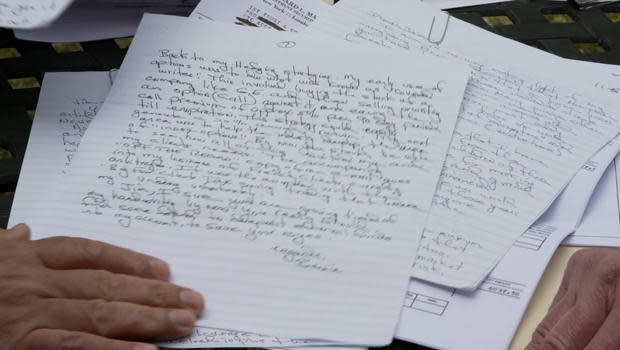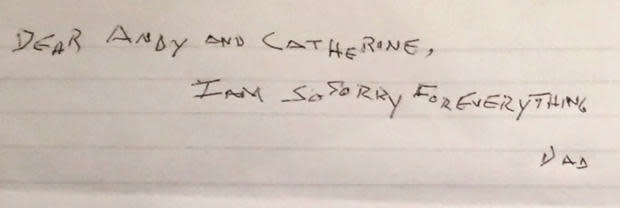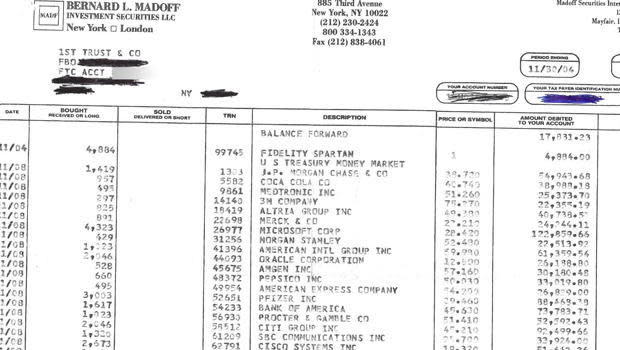Bernie Madoff: How he pulled it off

- Oops!Something went wrong.Please try again later.
- Oops!Something went wrong.Please try again later.
For the 12-and-a-half years between his arrest and his death this past April 14, Bernie Madoff barely said a word to reporters … or so we thought. It turns out he was engaged in extensive correspondence with a journalist named Jim Campbell – 400 pages' worth.
There were handwritten letters, Campbell told correspondent Jim Axelrod. "The vast bulk of 400 pages is emails. I have a chunk, they're single spaced, they're long. They're full of compulsion to explain. Very Nixonian in the need to rationalize and justify his behavior."

Campbell is out with a book, "Madoff Talks," which takes us inside the mind of the man who perpetrated the biggest fraud in American financial history.
Axelrod asked, "Did he ever express remorse?"
"Yes, and it would happen this way: 'My lawyers tell me I have to express remorse, Jim,'" Campbell said. "I said, 'Here's a victim that you decimated, how do you feel about that?' And he said, 'I really … a tremendous amount of remorse. Please tell her that I say that.'"
"Why didn't he reach out to her himself and say, 'I'm sorry'?"
"He couldn't do that, really."
His grotesque ego permitted only one sentence of apology to his son, Andrew, but allowed him to write letter after letter to a stranger, to try to manage his legacy.
Campbell said, "You realize that he's writing a guy that he's never met, six-, seven-page single-spaced letters, and he sent a letter to Andy and his fiancée-partner one sentence: 'I'm so sorry, Dad.' Not even 'love' – 'I'm so sorry, Dad.'"

"That's chilling," Axelrod said.
"It illuminates a narcissist that is compelled to rationalize what happened. Sometimes he would go, 'Jim, you know, nobody knows why Madoff did this.' I'd say, 'Bernie, you're Madoff!'"
Prison officials refused Campbell's request for a face-to-face visit with Madoff, but he took Madoff's wife, Ruth, to lunch many times starting in 2011.

Axelrod asked, "Was Ruth Madoff complicit?"
"My assessment is she was not complicit and she did not know about it," said Campbell. "I asked her, 'What did you say after Bernie told you guys?' 'What is a Ponzi scheme?'"
"And you think that's on the level? You think Ruth Madoff really didn't know what a Ponzi scheme was?"
"I don't believe that she really understood what was going on."
"It removes an element of sinister that Bernie has attached to him, and just makes Ruth tragic."
"It does," said Campbell, "and also it's, again, emanating from Madoff's ego. He could never have admitted to his wife and family that he was running this thing as a criminal enterprise."
Bernie Madoff outlived both his sons: Mark died by suicide on the second anniversary of Madoff's arrest; Andrew died of cancer in 2014. Campbell said, "Andrew would say to me, 'He killed Mark quickly, he's killing me slowly.'"
Andrew and his brother had worked for their father in a legitimate billion-dollar market-making business Madoff kept separate from the Ponzi scheme. After Madoff confessed to his sons, they turned him in. Andrew never spoke a word to him again.
Axelrod asked, "Did he have any capacity for introspection?"
"No. Not much. I don't think he had introspection, because he's keeping this thing running in his brain every day, complete criminal enterprise, at the same time he's keeping the legitimate business going. How could a guy do that if he looked inside himself for two minutes?"
"It's the work of a psychopath."
"It's the work of a financial psychopath, yes," Campbell said.
Campbell showed Axelrod one of the principle tools of the fraud: a statement of Madoff's firm that went to his investors each month.

"Morgan Stanley, PepsiCo, American Express, Pfizer, Bank of America, Procter & Gamble – this particular client thought Madoff was investing his or her money in these companies?" Axelrod asked.
"Yes."
Was he? "No, it's completely fake," said Campbell. "He had complete phony records run off of an old, archaic IBM AS400. And every trade there [was] faked. But that was just for the regulators and for show."
Campbell says plenty of blame extends well beyond Madoff. When Axelrod asked how regulators could not uncover the fraud, he replied, "It's inexcusable, it's gross negligence, incompetence."
But at the heart of his story is a criminal mastermind who kept spinning to the end. Said Campbell, "He thought that I would set the record straight, and you'll see the first letter says, 'You can help clear up all the misperceptions that are out there.'"
If that was his calculus, then Bernie Madoff's final investment, in Jim Campbell, ended up like all the others: worthless.
He said, "I say it's not too far of a stretch to say that he was a monster. He was 'a product,' as he told me, 'of the corrupt nature of Wall Street.'"
"So, it was somebody else's fault?" asked Axelrod.
"Yes, the blame was always shifted to somebody else."
READ AN EXCERPT: "Madoff Talks" by Jim Campbell
For more info:
madofftalksbook.com"Madoff Talks: Uncovering the Untold Story Behind the Most Notorious Ponzi Scheme in History" by Jim Campbell (McGraw-Hill Education), in Hardcover and eBook formats, available April 27 via Amazon and Indiebound
Story produced by Amol Mhatre. Editor: Emanuele Secci.
Chauvin verdict renews calls for racial justice nationwide

